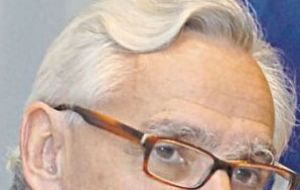MercoPress. South Atlantic News Agency
Argentina’s 2011 presidential election: a Peronist party dispute, forecasts analyst
 Rosendo Fraga sees limited chances for the Argentine opposition
Rosendo Fraga sees limited chances for the Argentine opposition The most probable political scenario for Argentina’s October 2011 presidential election is a run-off between two candidates from the hegemonic Justicialista party, centre left and centre right, according to Argentine historian and political analyst Rosendo Fraga.
The expert was invited to Montevideo by the Uruguayan Chamber of Commerce and Services and the Uruguayan International Relations Council, to give a conference on the Argentine political outlook a month after the death of former president Nestor Kirchner, the country’s most influential leader as recognized by friends and foes.
“A month ago the president in the run off would have been opposition candidate Raul Alfonsín. If elections were held today, President Cristina Kirchner would repeat. In the coming eleven months the most probable scenario is for two (ruling party) Peronists to dispute the run off”, said Fraga.
He added that “the most probable incumbent candidate will be President Cristina Kirchner, although Daniel Scioli, the second most important figure in the ruling Peronist Party and governor of the decisive Buenos Aires province, revealed it’s not clear whether Mrs Kirchner will effectively be running”.
The main opposition political force, the Partido Radical of Alfonsín has since “lost ground in its chances of winning”, said Fraga. “The party is divided and since its main ally Elisa Carrió announced her presidential candidacy she will pinch votes from the Radicales and impede Alfonsin’s access to the run off”.
On the left another self proclaimed candidate, “Pino” Solanas is expected to take votes from the incumbent Peronist candidate thus also preventing Cristina Kirchner from a first round victory.
The centre right candidate and mayor of the city of Buenos Aires Mauricio Macri “is the candidate Mrs Kirchner most prefers since this would easily present two clearly electoral options in ideological opposed poles”.
However the big question is who is going to compete with the incumbent candidate. “Given the dynamics of the Peronist movement I’m under the impression, although it’s not today’s picture that it’s going to be another Peronist, be it Scioli or Senator Carlos Reutemann. On one side the “Kirchner Peronism” with the support of a centre left coalition and on the other dissident Peronism with a centre right coalition”.
Fraga also mentioned some of the changes that have happened in Argentina since the death of Nestor Kirchner, and said that is spite of the fact all seems to be working better, “the government image improved but its power diminished”.
Cristina Kirchner’s change of attitude towards the business sector and a more conciliatory message plus an overture to the IMF, --blasphemy under Mr. Kirchner--, indicate changes, but the conflict with the media (mainly the group belonging to Clarin) rages on and has intensified with a greater ideological input.
“In foreign policy no changes can be expected. An ambiguous relation with the United States and in the region an oscillating pendulum between Brasilia and Caracas”, underlined Fraga.
An overview of economic prospects was presented by economist Dante Sica, who said no major changes can be expected in the current policy but underlined inflation and the appreciation of the Argentine currency as the main challenges.
“The big question is whether the model still has the capacity next year to contain the economy and the reply is yes: 2012 will be the year of the necessary inevitable adjustments and corrections”, said Sica.
He added the Argentine economy would expand 9% in 2010 and 6% in 2011 with inflation averaging 25%.
The inflow of dollars into Argentina and how to avoid the appreciation of the currency and retain a “competitive” exchange rate is the other big problem. However on the positive side the trade surplus has allowed Argentina to accumulate a high level of international reserves and has helped to prevent the outflow of capital from fearful Argentines.




Top Comments
Disclaimer & comment rules-

Read all comments“Rosendo Fraga sees limited chances for the Argentine opposition.” How so? What about Lilita Carrió? Mauricio Macri? haha Rosendo, you can go to lpqtp. A kiss from me to Monique entre her cachas abiertas ;)
Nov 30th, 2010 - 05:02 pm 0Commenting for this story is now closed.
If you have a Facebook account, become a fan and comment on our Facebook Page!